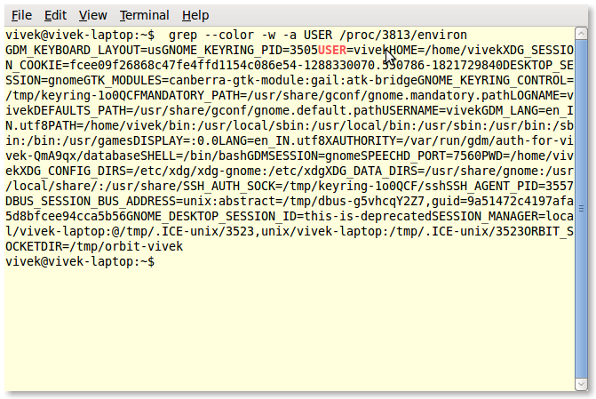Linux Find Out Which Process Is Listening Upon a Port
Written by Laurent Marechal - 23 april 2020
Classified in : Unix, Dev, Links - Tags : none
Site d'origine : https://www.cyberciti.biz/faq/what-process-has-open-linux-port/
How do I find out running processes were associated with each open port on Linux? How do I find out what process has open TCP port # 111 or UDP port 7000 under Linux using the CLI?
A port is nothing but an endpoint of communication used in computer networks. You have physical or wireless connections at the hardware level. At software or operating system level a port act as a logical construct that acts as communication port of network service such as SSH, HTTPD and more. TCP and UDP are the most common port. TCP is an acronym for Transmission Control Protocol. UDP is an acronym for User Datagram Protocol. See the several difference between UDP and TCP internet protocols here. This page shows Linux commands to find out which process is listing upon a TCP or UDP port.
Linux Find Out Which Process Is Listening Upon a Port
You can the following programs to find out about port numbers and its associated process:
- netstat command or ss command – a command-line tool that displays network connections, routing tables, and a number of network interface statistics.
- fuser command – a command line tool to identify processes using files or sockets.
- lsof command – a command line tool to list open files under Linux / UNIX to report a list of all open files and the processes that opened them.
- /proc/$pid/ file system – Under Linux /proc includes a directory for each running process (including kernel processes) at /proc/PID, containing information about that process, notably including the processes name that opened port.
You must run above command(s) as the root user.
Linux netstat command find out which process is listing upon a port
Type the following command:
# netstat -tulpn
Sample outputs:
Active Internet connections (only servers)
Proto Recv-Q Send-Q Local Address Foreign Address State PID/Program name
tcp 0 0 127.0.0.1:3306 0.0.0.0:* LISTEN 1138/mysqld
tcp 0 0 0.0.0.0:111 0.0.0.0:* LISTEN 850/portmap
tcp 0 0 0.0.0.0:80 0.0.0.0:* LISTEN 1607/apache2
tcp 0 0 0.0.0.0:55091 0.0.0.0:* LISTEN 910/rpc.statd
tcp 0 0 192.168.122.1:53 0.0.0.0:* LISTEN 1467/dnsmasq
tcp 0 0 0.0.0.0:22 0.0.0.0:* LISTEN 992/sshd
tcp 0 0 127.0.0.1:631 0.0.0.0:* LISTEN 1565/cupsd
tcp 0 0 0.0.0.0:7000 0.0.0.0:* LISTEN 3813/transmission
tcp6 0 0 :::22 :::* LISTEN 992/sshd
tcp6 0 0 ::1:631 :::* LISTEN 1565/cupsd
tcp6 0 0 :::7000 :::* LISTEN 3813/transmission
udp 0 0 0.0.0.0:111 0.0.0.0:* 850/portmap
udp 0 0 0.0.0.0:662 0.0.0.0:* 910/rpc.statd
udp 0 0 192.168.122.1:53 0.0.0.0:* 1467/dnsmasq
udp 0 0 0.0.0.0:67 0.0.0.0:* 1467/dnsmasq
udp 0 0 0.0.0.0:68 0.0.0.0:* 3697/dhclient
udp 0 0 0.0.0.0:7000 0.0.0.0:* 3813/transmission
udp 0 0 0.0.0.0:54746 0.0.0.0:* 910/rpc.statd
TCP port 3306 was opened by mysqld process having PID # 1138. You can verify this using /proc, enter:
# ls -l /proc/1138/exe
Sample outputs:
lrwxrwxrwx 1 root root 0 2010-10-29 10:20 /proc/1138/exe -> /usr/sbin/mysqld
You can use grep command or egrep command to filter out information:
# netstat -tulpn | grep :80
Sample outputs:
tcp 0 0 0.0.0.0:80 0.0.0.0:* LISTEN 1607/apache2
A note about ss command
Some Linux distro considered the nestat command as deprecated and therefore should be phased out in favor of more modern replacements such as ss command. The syntax is:
$ sudo ss -tulpn
$ sudo ss -tulpn | grep :3306

Video demo
fuser command
Find out the processes PID that opened tcp port 7000, enter:
# fuser 7000/tcp
Sample outputs:
7000/tcp: 3813
Finally, find out process name associated with PID # 3813, enter:
# ls -l /proc/3813/exe
Sample outputs:
lrwxrwxrwx 1 vivek vivek 0 2010-10-29 11:00 /proc/3813/exe -> /usr/bin/transmission
/usr/bin/transmission is a bittorrent client, enter:
# man transmission
OR
# whatis transmission
Sample outputs:
transmission (1) - a bittorrent client
Find Out Current Working Directory Of a Process
To find out current working directory of a process called bittorrent or pid 3813, enter:
# ls -l /proc/3813/cwd
Sample outputs:
lrwxrwxrwx 1 vivek vivek 0 2010-10-29 12:04 /proc/3813/cwd -> /home/vivek
OR use pwdx command, enter:
# pwdx 3813
Sample outputs:
3813: /home/vivek
Find Out Owner Of a Process on Linux
Use the following command to find out the owner of a process PID called 3813:
# ps aux | grep 3813
OR
# ps aux | grep '[3]813'
Sample outputs:
vivek 3813 1.9 0.3 188372 26628 ? Sl 10:58 2:27 transmission
OR try the following ps command:
# ps -eo pid,user,group,args,etime,lstart | grep '[3]813'
Sample outputs:
3813 vivek vivek transmission 02:44:05 Fri Oct 29 10:58:40 2010
Another option is /proc/$PID/environ, enter:
# cat /proc/3813/environ
OR
# grep --color -w -a USER /proc/3813/environ
Sample outputs (note –colour option):

lsof Command Example
Type the command as follows:
lsof -i :portNumber
lsof -i tcp:portNumber
lsof -i udp:portNumber
lsof -i :80
lsof -i :80 | grep LISTEN
|
Sample outputs:
apache2 1607 root 3u IPv4 6472 0t0 TCP *:www (LISTEN)
apache2 1616 www-data 3u IPv4 6472 0t0 TCP *:www (LISTEN)
apache2 1617 www-data 3u IPv4 6472 0t0 TCP *:www (LISTEN)
apache2 1618 www-data 3u IPv4 6472 0t0 TCP *:www (LISTEN)
apache2 1619 www-data 3u IPv4 6472 0t0 TCP *:www (LISTEN)
apache2 1620 www-data 3u IPv4 6472 0t0 TCP *:www (LISTEN)
Now, you get more information about pid # 1607 or 1616 and so on:
# ps aux | grep '[1]616'
Sample outputs:
www-data 1616 0.0 0.0 35816 3880 ? S 10:20 0:00 /usr/sbin/apache2 -k start
I recommend the following command to grab info about pid # 1616:
# ps -eo pid,user,group,args,etime,lstart | grep '[1]616'
Sample outputs:
1616 www-data www-data /usr/sbin/apache2 -k start 03:16:22 Fri Oct 29 10:20:17 2010
Where,
- 1616 : PID
- www-date : User name (owner – EUID)
- www-date : Group name (group – EGID)
- /usr/sbin/apache2 -k start : The command name and its args
- 03:16:22 : Elapsed time since the process was started, in the form [[dd-]hh:]mm:ss.
- Fri Oct 29 10:20:17 2010 : Time the command started.
Help: I Discover an Open Port Which I Don’t Recognize At All
The file /etc/services is used to map port numbers and protocols to service names. Try matching port numbers:
$ grep port /etc/services
$ grep 443 /etc/services
Sample outputs:
https 443/tcp # http protocol over TLS/SSL
https 443/udp
Check For rootkit
I strongly recommend that you find out which processes are really running, especially servers connected to the high speed Internet access. You can look for rootkit which is a program designed to take fundamental control (in Linux / UNIX terms “root” access, in Windows terms “Administrator” access) of a computer system, without authorization by the system’s owners and legitimate managers. See how to detecting / checking rootkits under Linux.
Keep an Eye On Your Bandwidth Graphs
Usually, rooted servers are used to send a large number of spam or malware or DoS style attacks on other computers.
Conlcusion
You learned various Linux commands to find information about running process and their ports. See the following man pages for more information:
$ man ps
$ man grep
$ man lsof
$ man netstat
$ man fuser
ADVERTISEMENTS
Comments are closed.

